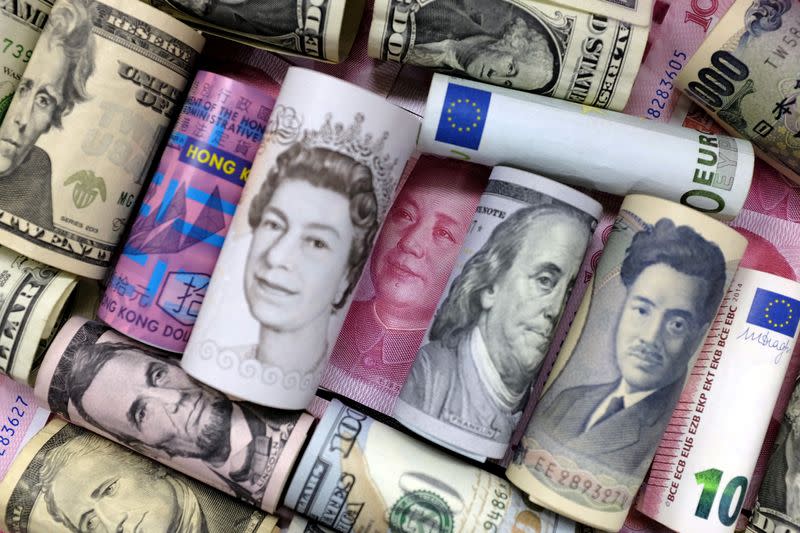Morning Bid: Transatlantic split reopens as half-year nears

A look at the day ahead in U.S. and global markets from Mike Dolan
Global investors head to the half-year point this week trying to get across numerous political narratives, a hiccup in tech and a reopening of the transatlantic gap in business activity.
Throw in Friday's looming release of the Federal Reserve's favoured PCE inflation gauge and an ongoing slide in Japan's yen and China's yuan and it's a sparkier summer than the buoyant first-half world markets numbers might suggest.
The shakeout in artificial intelligence torchbearer Nvidia last week, which saw its stocks recoil about 10% from new records by the end of the week, probably owes much to profit taking on its blistering rise - and perhaps also something to do with Friday's major futures and options expiries.
But with the U.S. presidential TV debate this Thursday likely to sound the starting gun on speculation around November's election outcome, the final week of the first half potentially ushers in a change of tone.
Politics dominates in Europe too, with the first round of France's parliamentary election this weekend and as Britainheads to the polls on July 4.
So far on Monday at least, the electoral anxiety hasn't disturbed too much in markets. European stocks pushed higher, Britain's FTSE was up and U.S. stock futures were marginally positive ahead of the bell. The VIX volatility gauge has crept to its highest of the month, however.
That owes something to renewed interest rate cut hopes in Europe and in the United States - where the PCE release for May should re-emphasise that disinflation has resumed.
But the latest sweep of economic and business health readings for June have showed a marked divergence again in fortunes either side of the Atlantic.
Flash business surveys for the euro zone and Britain showed overall activity slowing much more than forecast this month - barely remaining in expansionary territory for June.
But the equivalent U.S. soundings picked up a gear and show a much faster growth clip.
ECONOMIC SURPRISE INDEX TURNS NEGATIVE
Adding to the confusion, and perhaps the greater comfort that more interest rate cuts are coming in the second half, is the fact that the aggregate global economic surprise index has turned negative to the worst reading in almost a year.
What's more, the hesitant business move in Europe was underlined on Monday as Germany's Ifo institute showed business morale falling unexpectedly. Ifo's business climate index sank to 88.6 in June from 89.3 in May, compared with a reading of 89.7 forecast.
But the real market price action was in Japan's yen, which skidded again to within a whisker of the 160 per dollar - close to 34-year low of 160.245 it set in April before the Bank of Japan intervened to prop it up.
Japan's top currency diplomat Masato Kanda said on Monday authorities would take appropriate steps if there was excessive foreign exchange movement, and that the addition of Japan to the U.S. Treasury's "monitoring list" would not restrict their actions.
Treasury last week said no major trading partner appeared to have manipulated its currency last year, but it added Japan to a foreign exchange monitoring list alongside China, Vietnam, Taiwan, Malaysia, Singapore and Germany, which were on the previous list.
A summary of opinions at the BOJ's June policy meeting, meantime, showed some policymakers called for raising interest rates in a timely fashion as they saw a risk of inflation overshooting expectations.
Although Japan's Nikkei lapped up the weak yen and climbed 0.5%, signs of renewed foreign capital flight and rising global trade tensions saw China's ailing markets underperform yet again.
The mainland CSI300 dropped 0.5% on Monday and the offshore yuan hit its weakest level of the year.
In company news, Apple's App Store rules breach EU tech rules because they prevent app developers from steering consumers to alternative offers, EU antitrust regulators said on Monday, a charge that could result in a hefty fine for the iPhone maker.
Other big movers included Eurofins Scientific, which dropped as much as 19% after short seller Muddy Waters said it took a short position out on the French testing company.
Britain's Prudential added 6.3% after the insurance group launched a $2 billion share buyback programme.
Key developments that should provide more direction to U.S. markets later on Monday:
* Dallas Fed June manufacturing survey
* Federal Reserve Board Governor Christopher Waller speaks in Rome, San Francisco President Federal Reserve President Mary Daly speaks; Bank of Canada governor Tiff Macklem speaks
* US Treasury auctions 3-, 6-month bills
* US corporate earnings: Beyond Air, MoneyHero
(By Mike Dolan, editing by Alex Richardson mike.dolan@thomsonreuters.com)

 Yahoo Finance
Yahoo Finance 